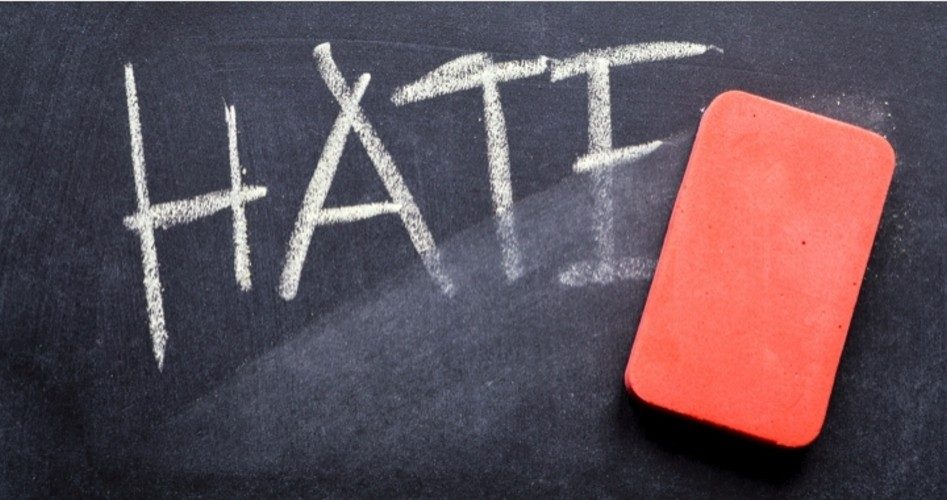
“The business of Progressives is to go on making mistakes,” noted philosopher G.K. Chesterton. “The business of Conservatives is to prevent mistakes from being corrected.”
While everyone is distracted with COVID-craziness Wuhan woes, a disease harder to remedy than a coronavirus continues spreading across our land: creeping leftism. The latest example is how even many “conservatives” in Georgia — a (formerly?) “red” state — are supporting a new hate-crime law.
Georgia is one of only four states without such legislation. But that may change with the killing of Ahmaud Arbery, a 25-year-old black man who was shot in the town of Satilla Shores on February 25 by two white men. For the incident is being used, unsurprisingly, to advance hate-crime law.
I’m not here to adjudicate the Satilla Shores case. The two white men were arrested earlier this month and charged with felony murder and aggravated assault, and some conservatives are already calling Arbery’s death a homicide. This appears a rational take, and very well may be correct; what’s not correct is to use the event to justify bad legislation.
Yet such is no doubt coming because the propaganda is thick. After the suspects’ arrest, for example, Atlanta mayor Keisha Lance Bottoms injected herself into the matter from 300 miles away, called the shooting a lynching, and blamed President Trump. Left-wing pundits have been agitating likewise.
Even more tragically, though, are the “conservatives” busy conserving yesterday’s liberals’ mistakes as they support the hate-crime proposals conservatives opposed 20 years ago.
Most notable among them “is no less than Georgia’s speaker of the House, republican [sic] David Ralston,” writes American Thinker. “Just days ago, in an interview with the Atlanta Journal-Constitution (AJC), Ralston said that once Georgia’s legislative session resumes in June, he will ‘challenge and implore’ the Georgia Senate to pass the hate crimes bill already adopted by his chamber, House Bill 426, ‘with no delay and no amendments.’”
Red flag: When a politician says he will “implore” others to enact a law “with no delay and no amendments,” suspect you’re about to be shafted. For what’s often happening is that — not letting a crisis go to waste — the legislator wants to ram the bill through before the reason-clouding emotion dissipates and cooler heads can prevail (value-signaling is a motivation, too). After all, what’s the rush? If the law really is a good idea, it will still be a good idea in a year’s time.
Yet hate-crime law isn’t a good idea anytime. This is mainly because such legislation can be an effort at thought control, as it dictates that a given act warrants more punishment if certain ideas are expressed through it.
It also paves the way for hate speech law, as I explained in my 2006 piece, “How We Will Lose Our Freedom of Speech.” Why? In brief, because “hate crimes” are generally deemed such based on the words uttered (e.g., racial epithets) during their commission. And government punishing of speech in any context sets a precedent and can lead to government punishing of that speech in every context.
Moreover, should the state be empowered to play mind reader/thought police? Should it mete out punishment based on impure thoughts divined by a judge and measured against a hierarchy of mind sins? Punish known actions — not inferred motivations.
Unfortunately, Georgia governor Brian Kemp has signaled willingness to sign the hate-crime bill. And given the media’s propagandistic use of the white-on-black Arbery killing and that politicians are so often afflicted with another disease — jellyfishcus spinovirus — it will likely become law.
Yet even if the Arbery incident were a “hate crime,” it would be an outlier. As American Thinker informs:
Using the latest Bureau of Justice Statistics survey of criminal victimization (2018), Manhattan Institute researcher Heather Mac Donald reveals: “There were 593,598 interracial violent victimizations … between blacks and whites last year, including white-on-black and black-on-white attacks. Blacks committed 537,204 of those interracial felonies, or 90 percent, and whites committed 56,394 of them, or less than 10 percent.”
Mac Donald adds, “Blacks are also overrepresented among perpetrators of hate crimes — by 50 percent — according to the most recent Justice Department data from 2017; whites are underrepresented by 24 percent. This is particularly true for anti-gay and anti-Semitic hate crimes.” In other words, in spite of the narrative so often perpetuated by hate crime apologists, America does not have a problem with white-on-black hate crime.
But it’s clear who’s most guilty: the media (and the market empowering them). As to this, remember the unarmed 17-year-old shot by that grown man some years ago? Trayvon Martin and George Zimmerman were, respectively, their names, right?
Wrong.
I’m talking about 17-year-old white kid Chris Cervini, shot to death by black man Roderick Scott in Greece, New York, three years before the Martin incident. Unlike Zimmerman, Scott is built like a brick outhouse, is a highly trained martial artist, and never had a hand laid on him by the teen. As with Zimmerman, Scott said he thought his life could be in danger and was acquitted by a mostly white jury. Unlike Zimmerman again, however, the Scott incident never became national news and a federal case.
For the record, I accept both verdicts. The point, though, is that if the media didn’t present a skewed picture of interracial crime, there might not be an obsession with channeling Orwell and appointing government as mind reader.
As for the conservatives, note that positive change would mean actually trying to rescind hate-crime law. Overthrowing a status quo, however, can’t be expected from those oriented toward preserving the status quo. But that’s Conservatism Inc. — giving you yesterday’s liberals, today.
Image: sebastianosecondi/iStock/Getty Images Plus
Selwyn Duke (@SelwynDuke) has written for The New American for more than a decade. He has also written for The Hill, Observer, The American Conservative, WorldNetDaily, American Thinker, and many other print and online publications. In addition, he has contributed to college textbooks published by Gale-Cengage Learning, has appeared on television, and is a frequent guest on radio.



